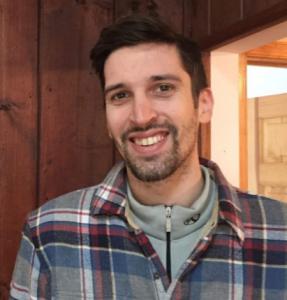THADDEUS STEPHENS ’10

Artist and entrepreneur Thaddeus Stephens is a true hustler, having developed myriad skills across his time at and after Wake Forest. Currently running his own business in Brooklyn, Thad was kind enough to walk us through his story and impart some very good advice.
FOUNDER
BRADY BROTHERS LUMBER
New York City, New York
WFU Class of 2010
Major: Studio Art and Economics
DeacLink: What are you up to right now?
Thaddeus Stephens: I work in fabrication making custom products in wood, metal, glass, plastics and whatever other materials are needed. I also have my own small business (Brady Brothers Lumber) making sculpturally inspired bags and home goods mainly from leather and textiles. Finally, I try to make sculptures and collages, when there is time left over.
DL: Take us through your journey from Wake to where you are now.
TS: I worked in restaurants both during and after my time at Wake Forest doing everything from cooking on the line to tending bar and waiting tables. Having that kind of experience gave me confidence in my ability to find work wherever I decided to go; there are restaurants everywhere. I bounced around a little bit and ended up in NYC. I got tired of working nights and weekends and decided that I didn’t want to stay in the restaurant business. I got some event production/set building work, did a little art handling, and ended up going to work in custom fabrication. I worked making custom designed chandeliers and lighting for about three years learning brass, aluminum, and glass skills. I just recently moved to a larger production shop. I want to continue making custom furniture and high end products but this current shop is a good place for me to get experience on some bigger tools and CNC tools that I have never used before.
DL: Who was your primary mentor/influencing professor while at WFU?
TS: Leigh Ann Hallberg, Paul Bright, and John Pickel. I’m still close with them and we always manage to get together when they’re in the city.
DL: How much did your studies or Wake in general inform or drive your career path?
TS: The art department taught me how to put a design into action and how to design an object, sculptural or otherwise, intentionally.
DL: What do you think Wake arts could have done to have better prepared students for life after graduation?
TS: Wake arts could emphasis the the need to become an expert in hard skills that can be applied outside of an artistic context. Making art is great but you also need to pay the bills! For example, if I had concentrated on becoming a journeyman level carpenter while I had unlimited access to a great shop at Wake, it would have been easier to find work after I left. The same could be applied to things like photography and Photoshop. If students get really good at one of these things then they’ll have some skills to shop around. It’s a lot easier to find work if you can say and show that you are a Photoshop wizard, or a technically expert photographer who can shoot weddings, for example.
DL: How have you found and applied to the jobs you’ve had?
TS: I have mostly found jobs through the internet (NYFA, Craigslist) and people I know. A lot of the stuff I do is gig based and you can find your way in through freelance or temporary positions.
DL: What’s the hardest part about breaking into your field?
TS: Having the hard skills to shop around. You can BS all you want to in an interview but if you get in the shop and can’t do what you have said you can it is apparent pretty quickly.
DL: How did you like living and working in NYC? Do you find it conducive to your larger goals?
TS: I don’t want to live anywhere else. Living is hard here and you have to get tough but it’s exactly where I want to live, work, and raise a kid. It’s a city of hustlers, everyone is working hard and getting things done.
DL: What has surprised you the most about the art scene in NYC? Do you have any advice for students wanting to move to move there?
TS: For people who want to move here: just do it. Get a couple thousand dollars together, find an apartment with a hundred roommates, and just move. You’ll be able to find work right away. It might not be exactly what you want to be doing but you can find a way to pay the bills while you get your feet on the ground.
DL: What and where is next for you?
TS: Staying in New York, working, and raising a baby.
DL: What’s the best kernel of advice you can think to pass on, or currently go by?
TS: I think Wake students often obsess over getting a “Job” as an almost mystical end unto itself. Don’t worry so much! Also don’t get scared away from doing what you want to do by parents or anyone else who are worried that it’s not a “stable career path.” You’re an adult and if you’re a capable, competent person you can land on your feet. If you’re already making compromises for the stake of stability at age 22, it’s not going to be any easier to do what you really want to at age 32. Just try to figure out how you want to live life and concentrate more on that and less on a stable income. Competence will out!
